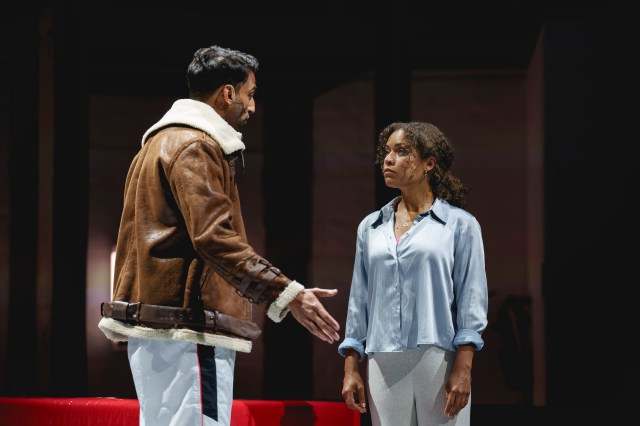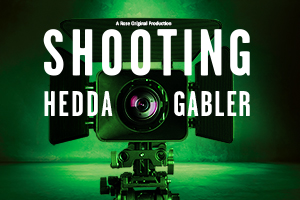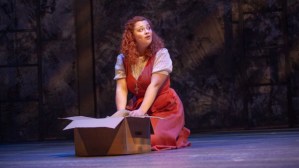Shooting Hedda Gabler at Rose Theatre, Kingston – review
Nina Segal’s world premiere runs until 21 October

Sometimes a riff on a classic text can get closer to the heart of the original than a straightforward revival, and so it proves with this riveting distillation of Ibsen’s cruel masterpiece. Nina Segal’s new play has a roughly similar relationship to the gun-toting 19th-century anti-heroine as Patrick Marber’s After Miss Julie and Don Juan in Soho did to Strindberg and Molière respectively, and is just as successful in reframing a familiar period piece in a bracingly modern way. It’s also, perhaps surprisingly, a hell of a lot of fun.
Segal’s Hedda (a terrific Antonia Thomas) is a Hollywood star whose work has been eclipsed by her off-screen antics, which unfortunately include being papped passed out drunk in the street and accidentally running over a member of the press in a self-driving Tesla (“he wasn’t killed?” asks a colleague, “he was maimed”, she responds, “lightly maimed”), and she’s in Norway to film an avant-garde movie version of the Ibsen. Segal gets delicious comic mileage out of the contrast between the soignée, entitled American actress and the affable but eccentric, and occasionally spiky, Norwegians who are more concerned with art than worrying about which plane class they’re flying in or whether or not they’re sharing a trailer.
At a time when coercion, abuse and safe-guarding are broadly discussed, particularly in the aftermath of the #MeToo movement, it’s fitting that Segal concentrates simultaneously on how these issues refract through the Hedda Gabler text and the creative process of a film helmed by an enigmatic, manipulative male director (played by Christian Rubeck in a blaze of dazzlingly Mephistophelean charm and danger). The result is meta but, thanks to the wit of the script and the supercool thriller-like trappings of Jeff James’s imaginative production, mostly accessible.
The parallels between Segal’s characters and Ibsen’s are nicely done and seldom feel belaboured. Rubeck’s Henrik inherits the misogynist mantle of unscrupulous Judge Brack, and recovering addict and Hedda’s LA actor ex, played with bravado but disarming vulnerability by Avi Nash, stands in for tormented poet Løvborg. The dialogue is engrossing, peppered with laugh-out-loud moments (at one point, Thomas’s bemused actress, following an on-set counselling session, ponders that, had Hedda Gabler been in therapy, Ibsen’s drama would have played out quite differently) and several really nasty shocks. Famous lines from Ibsen pop up in the modern play to telling effect before being bounced back into their original context.
At its core, this is a provocative and powerful piece, but with some pleasingly bonkers touches. Matilda Bailes is a joy as an eager supporting actress who periodically turns up, rather like a humanoid Cheshire Cat from Lewis Carroll’s Alice in Wonderland, as everything from the intimacy co-ordinator on the film (“we are a small crew but we have resources”) to resident therapist, to the star’s major rival. Joshua James is quirky, detailed and hilarious as the flawed, neurotic actor cast opposite Hedda and makes vivid and convincing his descent to somewhere deeply troubling.
In a beautiful, quietly devastating performance, Anna Andresen hauntingly draws a painful portrait of the film’s assistant director, on the receiving end of Henrik’s demands and abuse whilst trying to remotely manage a fractured relationship with her teenage son. The scene near the top of act two where she describes the agonising push-pull nature of parenting to an incredulous Hedda is a little masterpiece of acceptance, love and repressed anguish. Thomas is a compelling, ambiguous central presence, her only flaw being an occasional tendency to inaudibility at moments of high distress.
James’s production has a swaggering energy tempered with icy intelligence. Though there are a few “what on earth is happening?” moments, where the whole concept threatens to become too clever for its own good, there is also a confidence in the staging and playing that ensures that we aren’t off track for too long. The mood turns on a dime, abetted by exciting contributions from Hansjörg Schmidt (lighting) and Kieran Lucas (sound and composition). Rosanna Vize’s vast, two-tiered set at first seems starkly clinical but reveals ever more detail the longer you stare at it, which is a fitting metaphor for the script itself.
This is startling, challenging, ambitious stuff, reminiscent of the Almeida or the Donmar at the top of their game. It’s thrilling when style and substance can co-exist as happily as they do here, and the acting is magnificent. Very highly recommended.
















